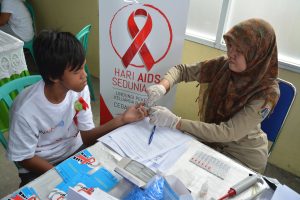In Indonesia, the HIV epidemic is a pressing public health concern. While the general population’s HIV prevalence is low, at 0.3 percent, it reaches almost 18 percent among specific high-risk groups, including female sex workers, transgender women, men who have sex with men, and intravenous drug users.
Young people, especially young men who have sex with men, are particularly vulnerable to HIV due to increased societal marginalization, higher likelihood of engaging in unprotected sex, and reluctance to access health and social services.
The media’s tendency to portray the behavior of men who have sex with men as conflicting with traditional values exacerbates the issue, leading to discriminatory regulations, censorship of LGBTQ-related content, and limitations on transgender individuals’ participation in various activities.
The delivery of HIV prevention services faces significant challenges in Bali, particularly in addressing the needs of young men who have sex with men.
The existing HIV prevention approach in Bali lacks appeal and relevance. Almost 10 years ago, an initiative to distribute free condoms was started with the aim to prevent transmission of HIV. Not everyone was happy with the action, especially among Bali’s young gay community. The condoms were perceived as lower quality than commercially available condoms. This, coupled with social stigma and disapproval, has contributed to the failure of prevention efforts.
The distribution of low-quality condoms and printed flyers in gay bars is outdated and ineffective. Peer educators, often older, are perceived as irrelevant, which creates a barrier to communication.
Young people advocate for a more inclusive, engaging and up-to-date approach – for example, emphasizing the importance of conveying key information on HIV prevention through apps used by the gay community.
Recognizing the limitations of current strategies, there is a growing call for interactive online HIV prevention, with customized messaging, broader outreach, and interaction through chat spaces and interactive projects.
However, the challenge lies in making online information appealing and relevant. Young men who have sex with men frequently criticize existing websites for being outdated and unattractive, noting low engagement among their peers.
A group of nine young men who have sex with men in Bali engaged in participatory action research to design a more effective HIV prevention strategy. They advocated for a “So Us” campaign that is fun, creative, social, and up-to-date — attributes that resonate with others in their cohort.
The campaign used blogs, websites, social media, and chat rooms to share information on HIV prevention, counseling and testing, safe sex practices, and updated news relevant to young men who have sex with men communities.
The participants suggested strategies such as creation of appropriate websites and apps, using the chat feature in gay-themed apps, developing an online forum, and placing online HIV prevention messages in existing gay social media and dating apps. They also considered the inclusion of games, interactive and moving images, the use of state-of-the-art technology, and content that engages young men who have sex with men, but with less focus on medicalized content.
Participants noted that despite the availability of the internet for delivering HIV prevention messages, social and cultural norms continue to pose challenges in online promotion of healthy sexual behavior.
Another benefit of using online methods in Indonesia is the creation of a comparatively secure communication platform that can preserve an individual’s privacy, particularly when addressing sensitive topics such as sexuality and HIV prevention.
Nevertheless, the persistent presence of stigma and risks remains an obstacle in the development and implementation of online HIV prevention initiatives.
Engaging in this initiative proved to be fulfilling and exhilarating for the group, fostering a sense of collective expression and empowerment, where each member is recognized as an expert. And it led to meaningful relationship building.
While these ideas are in the early stages of development in Bali and Indonesia, they hold promise for addressing the unique needs of young men who have sex with men in HIV prevention. The participatory action research approach has empowered the group, fostering a sense of collective expression and valuable relationship building.
As efforts progress, it is crucial to ensure the safety and privacy of young men who have sex with men, especially in the face of an increasingly challenging social environment in Indonesia.
Implementing these approaches cautiously and adapting them to the local context may pave the way for more effective HIV prevention strategies for young men who have sex with men across Indonesia.
Originally published under Creative Commons by 360info™.

































